Czech programmers wrote a site worth 16 million euros for free? Truth?
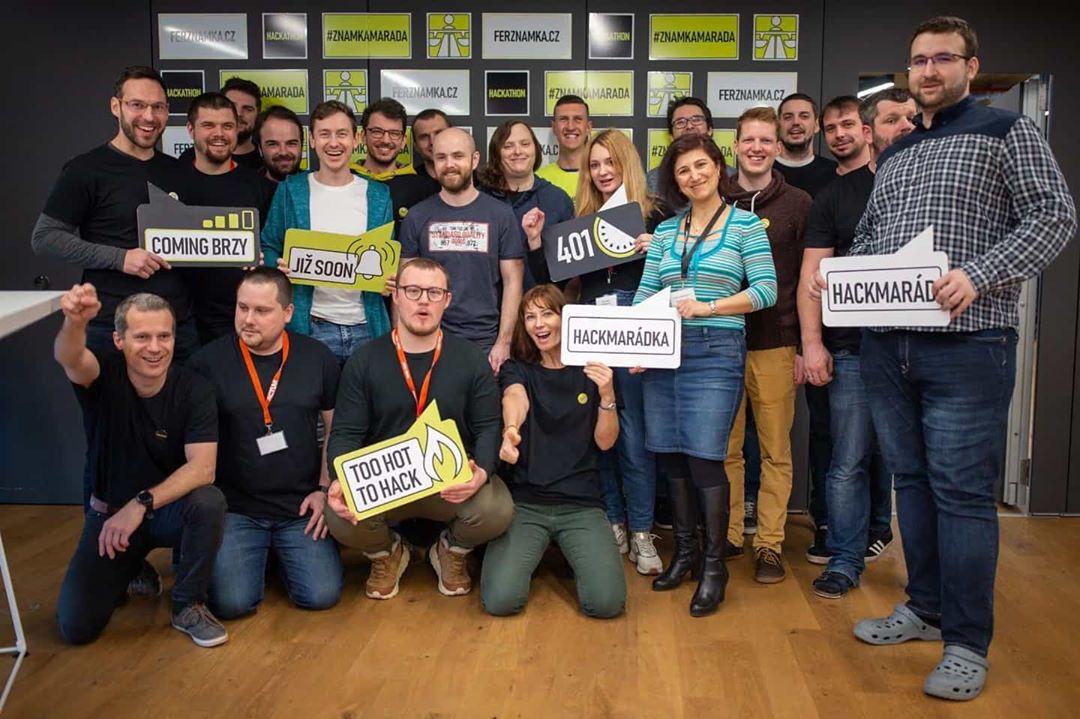 At the end of January 2020, Czech programmers for two days at no cost developed a portal for selling tickets for the right to use the Czech highways. The development of this portal was initially allocated 401 million Czech crowns (about 16 million euros) by the Czech Ministry of Transport, but the community’s enthusiasm allowed to save enormous budget funds.
At the end of January 2020, Czech programmers for two days at no cost developed a portal for selling tickets for the right to use the Czech highways. The development of this portal was initially allocated 401 million Czech crowns (about 16 million euros) by the Czech Ministry of Transport, but the community’s enthusiasm allowed to save enormous budget funds.
Based on the results of the hackathon, the created portal is planned to be transferred for use to citizens of the Czech Republic. The Minister of Transport was dismissed with shame, further tenders will be held in an atmosphere of transparency and accountability to citizens.
Such an account of the events was provided in a retelling of CNews or, at least, in this way was interpreted by readers.This amazing story captured the minds of the entire former USSR, repeatedly dispersing on social networks. However, unfortunately, in the original CNews presentation - probably unintentionally - a number of key details were omitted and distorted, as a result of which the initial situation was very peculiarly distorted.The purpose of this post is to bridge this gap.Disclaimer
Truth, like mushrooms, is propagated by spores.This post was formed during a long and fruitful discussion between the author (who visits Prague and Brno periodically, but every time for a short time) with Alexei Samorukov who constantly lives in the Czech Republic. Fragments of the discussion itself cannot be given on Habr because of the profanity repeatedly used in it, however the author leaves links in the post so that the reader can get acquainted with the original source.Ultimately, it is OK to agree to disagree.Disposition
 The picture shows a typical Czech highway . It is indicated by the same sign that in Russia marks the main road with a maximum permitted speed of 110 km / h (which limitation, of course, most people are used to calmly violating).
The picture shows a typical Czech highway . It is indicated by the same sign that in Russia marks the main road with a maximum permitted speed of 110 km / h (which limitation, of course, most people are used to calmly violating).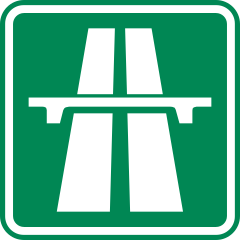 The speed limit in the Czech Republic is 110 km / h on roads and 130 km / h on highways (depending on the region), and they try to adhere to it. However, there are almost no speed cameras on these tracks (but I didn’t tell you).Naturally, building - and maintaining a decent condition - such a highway costs a lot of money. The Czech Republic has long come to the position that the cost of maintaining long interurban sections of expressways should be passed on to the shoulders of those who use them - motorists. In order to have the right to go on the main highway, the driver must pre-issue a special paper pass and put it under the windshield.
The speed limit in the Czech Republic is 110 km / h on roads and 130 km / h on highways (depending on the region), and they try to adhere to it. However, there are almost no speed cameras on these tracks (but I didn’t tell you).Naturally, building - and maintaining a decent condition - such a highway costs a lot of money. The Czech Republic has long come to the position that the cost of maintaining long interurban sections of expressways should be passed on to the shoulders of those who use them - motorists. In order to have the right to go on the main highway, the driver must pre-issue a special paper pass and put it under the windshield.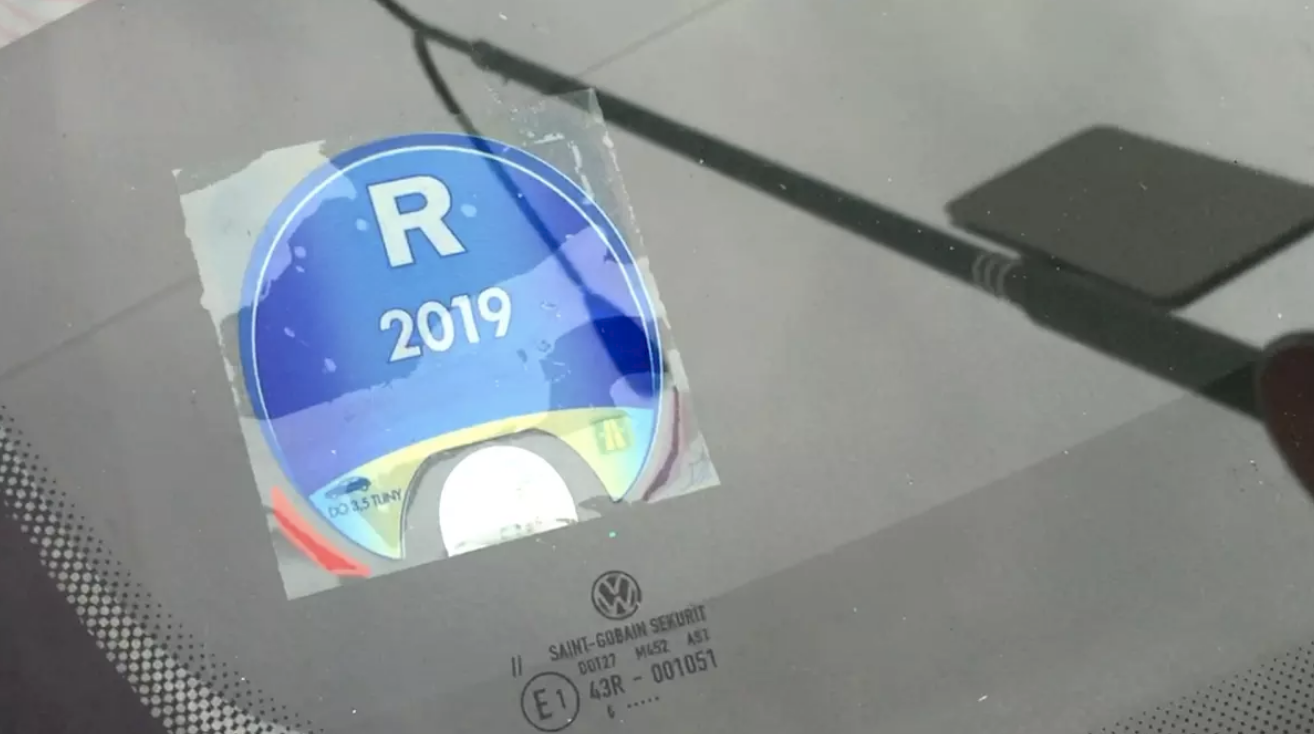 To date, such passes are issued in specialized stalls, as well as in post offices and at many gas stations. The maintenance of this infrastructure costs the budget a certain amount, but the most important thing is that it’s very inconvenient to look for these stalls and glue passes on the windshield (and then tear them back), especially if you, for example, are a tourist or travel infrequently.The Ministry of Transport of the Czech Republic, motivating its decision with a desire to simplify the lives of citizens, decided to introduce an electronic system for issuing passes. For a limited time, an electronic pass would be tied to a car number; it would not have to be received and printed out somewhere.
To date, such passes are issued in specialized stalls, as well as in post offices and at many gas stations. The maintenance of this infrastructure costs the budget a certain amount, but the most important thing is that it’s very inconvenient to look for these stalls and glue passes on the windshield (and then tear them back), especially if you, for example, are a tourist or travel infrequently.The Ministry of Transport of the Czech Republic, motivating its decision with a desire to simplify the lives of citizens, decided to introduce an electronic system for issuing passes. For a limited time, an electronic pass would be tied to a car number; it would not have to be received and printed out somewhere.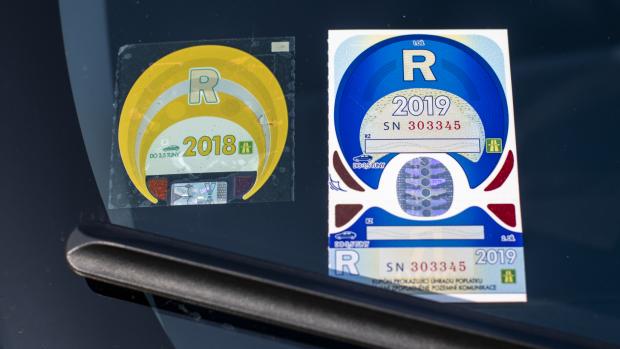 It was the development of such a system that provoked a huge scandal, which ultimately reached the former USSR.***Unfortunately, as is usually the case with a state judge, the description of the scandal cannot be complete within the framework of exclusively technical aspects of implementation. To create the necessary surroundings, we will have to close our eyes, hold our breath and plunge headlong into the modern political realities of the Czech Republic.
It was the development of such a system that provoked a huge scandal, which ultimately reached the former USSR.***Unfortunately, as is usually the case with a state judge, the description of the scandal cannot be complete within the framework of exclusively technical aspects of implementation. To create the necessary surroundings, we will have to close our eyes, hold our breath and plunge headlong into the modern political realities of the Czech Republic.Make Czechia Great Again
In accordance with the 2017 election results, the Czech Prime Minister is Andrei Babis , the founder and unchanging leader of the center-right populist party ANO . The name of the party is backronym of the Czech version of the word "yes." Before being elected, Babis was a businessman - one of the richest people in the Czech Republic. In 2011, Babis founded his own political party, which, just two years later, took second place in the elections, losing only to the Czech Social Democratic Party (ČSSD), founded in 1990 . After another 4 years, ANO took first place in the parliamentary elections with 18.7% of the vote, which allowed Babish to take the chair of the country's prime minister.A number of media love to compare Babish with Donald Trump, which gives some (of course, limited and incomplete) idea of this figure.
Before being elected, Babis was a businessman - one of the richest people in the Czech Republic. In 2011, Babis founded his own political party, which, just two years later, took second place in the elections, losing only to the Czech Social Democratic Party (ČSSD), founded in 1990 . After another 4 years, ANO took first place in the parliamentary elections with 18.7% of the vote, which allowed Babish to take the chair of the country's prime minister.A number of media love to compare Babish with Donald Trump, which gives some (of course, limited and incomplete) idea of this figure. Earlier in the same 2017, Babish was convicted of corruption . The division of the Agrofert company controlled by him received a subsidy of as much as 2 million euros from ERDF , which, according to the investigation, was due to fraud with the composition of the owners of the division. An investigation by the European Anti-Fraud Office confirmed the corruption of Babish’s actions.The fact of illegally receiving a sky-high sum of two million euros led to a vote of no confidence expressed by ANO by the Czech parliament and to the removal of political immunity from Babiš, however, following the results of the re-election, the prime minister’s immunity was restored, and ANO and ČSSD formed a coalition government .
Earlier in the same 2017, Babish was convicted of corruption . The division of the Agrofert company controlled by him received a subsidy of as much as 2 million euros from ERDF , which, according to the investigation, was due to fraud with the composition of the owners of the division. An investigation by the European Anti-Fraud Office confirmed the corruption of Babish’s actions.The fact of illegally receiving a sky-high sum of two million euros led to a vote of no confidence expressed by ANO by the Czech parliament and to the removal of political immunity from Babiš, however, following the results of the re-election, the prime minister’s immunity was restored, and ANO and ČSSD formed a coalition government .Portal
As part of the agreement with ČSSD, Vladimir Kremlik was appointed Minister of Transport in April 2019 .One of the first initiatives of the Kremlin was the creation of the ill-fated online system for issuing passes on the highway. Kremlik claims that he sent technical specifications for the creation and maintenance of the system to five different IT contractors, of which he subsequently chose the cheapest - the Polish outsourcer Asseco . This application amounted to the notorious 401 million kroons (to be precise, 400.3 million), or 15.8 million euros at the current rate. During this event, Kremlik violated all the accepted rules for organizing a state order. He did not organize a formal tender, did not publish a ToR, and single-handedly decided to select a contractor for as many as 400 million contracts, which for this project seems at first glance to be too much. The reputation of the protege of Babish to Minister Vladimir also, frankly, did not help.Still nothing, but in the history of the Czech Republic there is a colossal example of corruption in IT called Opencard, and, looking at what is happening, citizens vividly realized what was going on.
During this event, Kremlik violated all the accepted rules for organizing a state order. He did not organize a formal tender, did not publish a ToR, and single-handedly decided to select a contractor for as many as 400 million contracts, which for this project seems at first glance to be too much. The reputation of the protege of Babish to Minister Vladimir also, frankly, did not help.Still nothing, but in the history of the Czech Republic there is a colossal example of corruption in IT called Opencard, and, looking at what is happening, citizens vividly realized what was going on.Opencard
The Opencard municipal card was, in fact, an analogue of the Moscow Troika, adjusted for the fact that Prague had implemented a card access system for transport, libraries and discount programs 5 years earlier than Moscow. However, the implementation of the Opencard system was actually failed in Prague. Tenders for the implementation of Opencard were held with numerous violations. The issuance of each card was organized through the left-wing “laying” company, municipal money flowed out in many unknown directions. The implementation of Opencard cost the capital a fabulous 62 million dollars ; as a result of an organized multi-year investigation, a number of civil servants received conditional terms, and the Opencard system was eventually replaced by Lítačka, which is used to this day, while the end of life of Opencard comes in 2020.There is such a joke. “Today, at 8 a.m. Moscow time, the United States of America launched a single nuclear strike on the People’s Republic of China. According to rough estimates, there are no victims. ”Similarly, by the usual standards of Russians (and citizens of a number of neighboring countries), the “trifle” occurred, consider it really not a waste, but the Czech Republic by any standards is an order of magnitude smaller than Russia, and it was enough for them to see the attempt to make a system of highway passes without a tender, voters raised a riot.
Tenders for the implementation of Opencard were held with numerous violations. The issuance of each card was organized through the left-wing “laying” company, municipal money flowed out in many unknown directions. The implementation of Opencard cost the capital a fabulous 62 million dollars ; as a result of an organized multi-year investigation, a number of civil servants received conditional terms, and the Opencard system was eventually replaced by Lítačka, which is used to this day, while the end of life of Opencard comes in 2020.There is such a joke. “Today, at 8 a.m. Moscow time, the United States of America launched a single nuclear strike on the People’s Republic of China. According to rough estimates, there are no victims. ”Similarly, by the usual standards of Russians (and citizens of a number of neighboring countries), the “trifle” occurred, consider it really not a waste, but the Czech Republic by any standards is an order of magnitude smaller than Russia, and it was enough for them to see the attempt to make a system of highway passes without a tender, voters raised a riot.Top secret
According to the official plan, the system itself was supposed to be ready in the first year, however, the contractor (Polish Asseco) assumed responsibility for its support and operation until 2024.( ) , , “”, , .
The implementation of the system was to include a website, mobile applications for common platforms, payment reporting, clearing, a data protection system and a call center.More precisely, Kremlik justified himself in an interview with the media when the scandal was already raging.The terms of reference for the creation of the system were not published for unclear reasons. The opposition’s logical assumption was that TK was “charged” and implied gigantic multilateral pullbacks (up to 80% of the indicated amount). The Ministry of Transport bleached and blushed, the minister kept silent under the sights of television cameras.OSINT
The Hlídač Státu project was able to come up with one possible adequate reason for not publishing TK. The fact is that there are categories of vehicles with the right to freely travel on highways. These vehicles include police cars, ambulances, emergency services, as well as special services vehicles.Naturally, TK, defining in one way or another the criteria for determining whether a vehicle belongs to the special services park, could not be published.At first glance, this concept sounds logical, but it is only at first glance. In today's digital world, the main weapon of special services is OSINT- “open source intelligence” - analysis of information using Google, image search and today's almost endless open data sources.
The fact is that there are categories of vehicles with the right to freely travel on highways. These vehicles include police cars, ambulances, emergency services, as well as special services vehicles.Naturally, TK, defining in one way or another the criteria for determining whether a vehicle belongs to the special services park, could not be published.At first glance, this concept sounds logical, but it is only at first glance. In today's digital world, the main weapon of special services is OSINT- “open source intelligence” - analysis of information using Google, image search and today's almost endless open data sources.Telegram- «» , , , -. (, , ), , . ? , . — « ». .
: « » - , .
Introducing a special travel regime for special services vehicles would be colossal stupidity. The passage of special services vehicles along an open highway without the presence of a ticket under the windshield would obviously reveal the belonging of these vehicles to any observer armed with binoculars or a video camera.Accordingly, in the era of paper receipts, all special services paid for the fare as cute; therefore, it is unclear why it was necessary to introduce some new rules in the digitalization process.In general, such an explanation of the non-publicity of TK did not hold water.It was at that moment that Tomas Vondrachek announced a hackathon to create an analogue of the future system of issuing passes.Planning poker
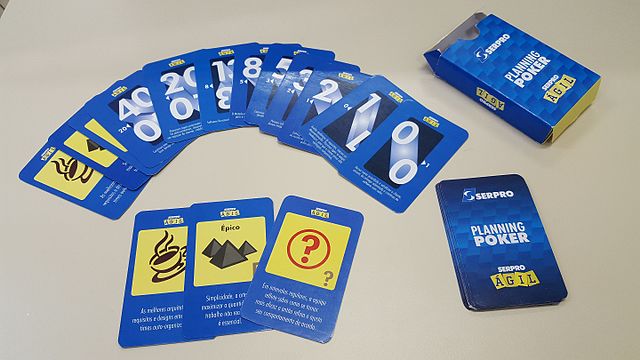 Flexible development methodologies often use a task cost estimation technique called poker planning . Its essence is as follows:
Flexible development methodologies often use a task cost estimation technique called poker planning . Its essence is as follows:- Team members receive cards with numbers (you can use regular poker cards from "deuce" to "eight");
- The product manager describes what problem he wants to solve;
- After a round of questions and answers, each of the team members “closed” lays out a card corresponding to his personal assessment of the complexity of the task;
- All bets are opened simultaneously;
- Those who have made the maximum and minimum rates discuss the problem among themselves and come to a consensus.
A more detailed and correct description can be found on Wikipedia ( English , Russian ). The main character of the story - Prague entrepreneur Tomas Vondracek - owns the outsourcing company ACTUM Digital . Judging by the profile on Linkedin, the company employs something like about one and a half hundred people who are responsible for various fronts of work: digital marketing, web development, consulting and even the Internet of things.Misunderstanding of these facts gave rise to a wave of speculation in Runet and its environs.The task that Vondrachek solved was by no means to present the finished project to the Babysh government for free.In fact, Vondrachek spent a round of poker planning with the Ministry of Transport.
The main character of the story - Prague entrepreneur Tomas Vondracek - owns the outsourcing company ACTUM Digital . Judging by the profile on Linkedin, the company employs something like about one and a half hundred people who are responsible for various fronts of work: digital marketing, web development, consulting and even the Internet of things.Misunderstanding of these facts gave rise to a wave of speculation in Runet and its environs.The task that Vondrachek solved was by no means to present the finished project to the Babysh government for free.In fact, Vondrachek spent a round of poker planning with the Ministry of Transport.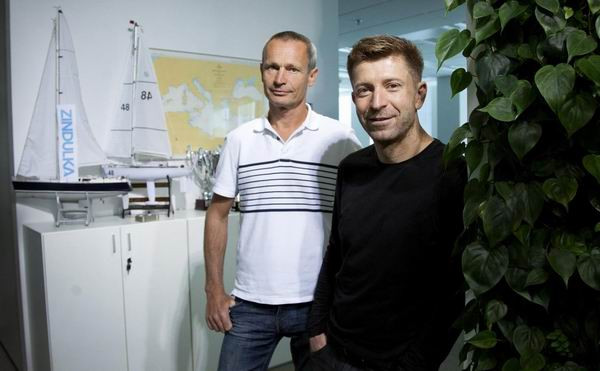 The Ministry previously closedly estimated the project cost at 400 million kroons. This assessment seemed to Vondrachek (and, obviously, to a hundred programmers who came to the hackathon) extremely overstated.In order to call the Ministry of Transport for an open dialogue, Tomas organized a completely open event with the involvement of the press, in the framework of which a prototype of the system was created. The process of his birth was possible to watch live, thus the Minister of Transport was deprived of the opportunity to declare that his political opponents underestimated the cost of development.
The Ministry previously closedly estimated the project cost at 400 million kroons. This assessment seemed to Vondrachek (and, obviously, to a hundred programmers who came to the hackathon) extremely overstated.In order to call the Ministry of Transport for an open dialogue, Tomas organized a completely open event with the involvement of the press, in the framework of which a prototype of the system was created. The process of his birth was possible to watch live, thus the Minister of Transport was deprived of the opportunity to declare that his political opponents underestimated the cost of development.— , , . , , , , 10% 1500 ( 9 ), — 16 , .
, , . . - , — 10% , , , 1%, 99%, 100 99% . .
Once again: the goal of the hackathon was not to create a working production system. If desired, Vondrachek could make such a system and give it to the state himself, without involving hundreds of programmers unfamiliar with each other, in fact, by announcement.The working system, in fact, did not work out. The most experienced IT manager Vondrachek openly says in each interview :- the portal needs to be debugged, it lacks documentation, it is not connected to the state bases it needs;
- a number of necessary components government agencies must develop themselves;
- the portal for development convenience was deployed in the Microsoft Azure Irish cloud, which is not the best choice for the Czech Republic government system;
- There are issues related to the quality of the whipped up code, support, copyright and licensing of the written code, and so on.
All these claims can be heard in the course of fierce Russian-language discussions. If it was really about putting into operation a finished project “meeting all the requirements” (as CNews put it), these claims would be completely fair, but this was not the task.Effects
Responding to public pressure, Andrei Babish announced the resignation of Kremlik from the post of Minister of Transport - less than a year after his appointment in April 2019., , . - ( -) «» «» «».
, . , , .
Contractor Asseco, for its part, terminated the contract, explaining this with reputational risks.Babish also announced that an investigation is planned. What exactly will be investigated and with respect to whom at the time of publication of this text is also unclear.Who's guilty?
Here the author is forced to enter with the reader on the unsteady ground of assumptions.- ?
, () IT-. (, ) Asseco, IT- .
ANO, , , . ANO «» ; . - , IT-? , — OSINT; ?
- : , , . , .
.
, , . .
BIS , , , , .
, , - — .
The only thing that is absolutely understandable is that I would like to wish good health to Tomas Vondrachek.Regardless of the further successes of Czech citizens in combating the multifaceted hydra of corruption, the author would also like to hope that the Russian media, selecting interesting foreign news stories, will be more accurate in dealing with the facts and in more detail understanding the issue, including involving Russian-speaking industry professionals.In this case, they could even be found directly in the Czech Republic, which separately depresses.***If you liked this text, then you may be interested in other articles written by me:Source: https://habr.com/ru/post/undefined/
All Articles